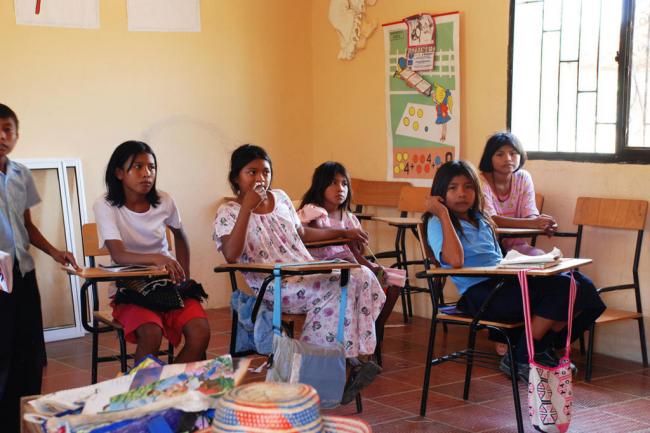
On International Day, UN spotlights indigenous peoples' right to education
“In some countries, less than 40 per cent of indigenous children attend school full-time. In many others, few indigenous children complete a full high school education,” UN Secretary-General Ban Ki-moon said in his message on the day.
“This is unacceptable,” said the UN chief, underscoring that “we will not achieve the Sustainable Development Goals if we fail to address the educational needs of indigenous peoples.”
Indigenous peoples regularly face stigmatization of their cultural identity and lack of respect and recognition for their heritage and values, including in textbooks and other educational materials. Moreover, their marginalization is often compounded by language barriers as instruction is mainly in the national language, with little or no instruction in, or recognition of, indigenous languages, noted Ban.
“I call on Governments everywhere to draw on the guidance of this international framework [the UN Declaration on the Rights of Indigenous Peoples] to improve access to education for indigenous peoples and to reflect their experiences and culture in places of learning,” urged the UN chief.
He also stressed the commitment to “ensuring indigenous peoples are not left behind as we pursue the vision of the Sustainable Development Goals.”
Hailing indigenous peoples' crucial role as custodians to rich cultural diversity, carrying unique wisdom of sustainable living and respect for biodiversity, Irina Bokova, Director-General of the UN Educational, Scientific and Cultural Organization (UNESCO), reaffirmed the organization's determination to safeguard and promote their identities, languages and knowledge syste
However, “nurturing and harnessing this potential calls for inclusive and equitable quality education for all,” she emphasized, adding that “too many indigenous peoples are still denied the full right to quality education.”
The right to education is fundamental, she said, also added that Indigenous knowledge systems hold many answers to mitigating the consequences of climate change.
“UNESCO will continue to draw on these to bolster scientific cooperation for biodiversity as well as education for sustainable development.” said Bokova.
This year's theme for the International Day – Indigenous Peoples and the Right to Education – reflects a core and underlying principle of the World Intellectual Property Organization (WIPO), according to its Director General Francis Gurry.
“WIPO's program of work in support of Indigenous Peoples focuses on appropriate tools, both existing or to be developed, to prevent the misuse of traditional knowledge and traditional cultural expressions by third parties,” said Gurry.
In his remarks on the International Day, Braulio Ferreira de Souza Dias, Executive Secretary of the Convention on Biological Diversity (CBD), pointed out the challenges indigenous peoples continue to face, especially their right to access a culturally appropriate education inclusive of their histories, world views and traditional knowledge.
“The CBD works on several themes relevant to indigenous education, most significantly traditional knowledge, innovations and practices, and customary sustainable use of biological diversity,” said Dias.
He added that the CBD Secretariat also works closely with indigenous peoples' regional and local organizations to deliver culturally appropriate training through a “train-the-trainer” methodology on participation in the implementation of the Convention.
Applauding for this year's timely theme, Phumzile Mlambo-Ngcuka, Executive Director of the UN Entity for Gender Equality and the Empowerment of Women (UN Women), said the theme also aligns with the 2030 Agenda for Sustainable Development's commitment to educational attainment among indigenous women and girls.
“Formal, non-formal and informal education are potent means to enhance the ability of indigenous women to reach their full potential,” said Mlambo-Ngcuka, adding that “formal education must also be promoted to ensure that indigenous girls and women are able to effectively participate in all domains of social, economic and political activity.”
However, she stressed that high levels of illiteracy among indigenous women regrettably attest to the historical patterns of discrimination and exclusion.
Moreover, the UN Permanent Forum on Indigenous Issues, the Special Rapporteur on the rights of indigenous peoples, the UN Expert Mechanism on the Rights of Indigenous Peoples and the UN Voluntary Fund for Indigenous Peoples jointly called upon States to ensure discrimination-free and culturally-sensitive education systems for indigenous peoples, taking into account their languages, cultures and histories.
They also urged that States and indigenous peoples must work together to fulfil indigenous peoples' right to establish and control their educational systems and institutions.
UN Photo/Gill Fickling
Source: www.justearthnews.com
Support Our Journalism
We cannot do without you.. your contribution supports unbiased journalism
IBNS is not driven by any ism- not wokeism, not racism, not skewed secularism, not hyper right-wing or left liberal ideals, nor by any hardline religious beliefs or hyper nationalism. We want to serve you good old objective news, as they are. We do not judge or preach. We let people decide for themselves. We only try to present factual and well-sourced news.







